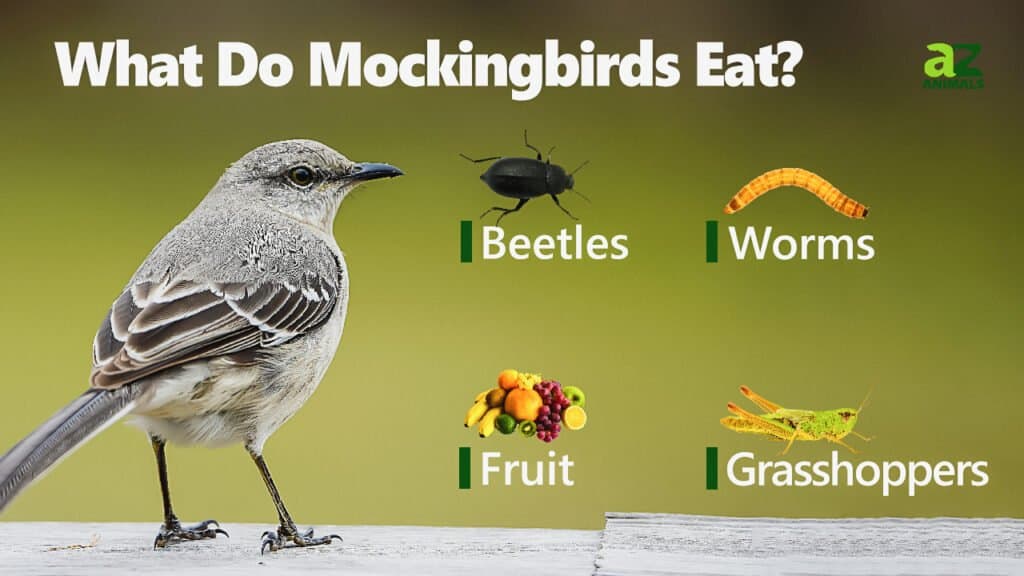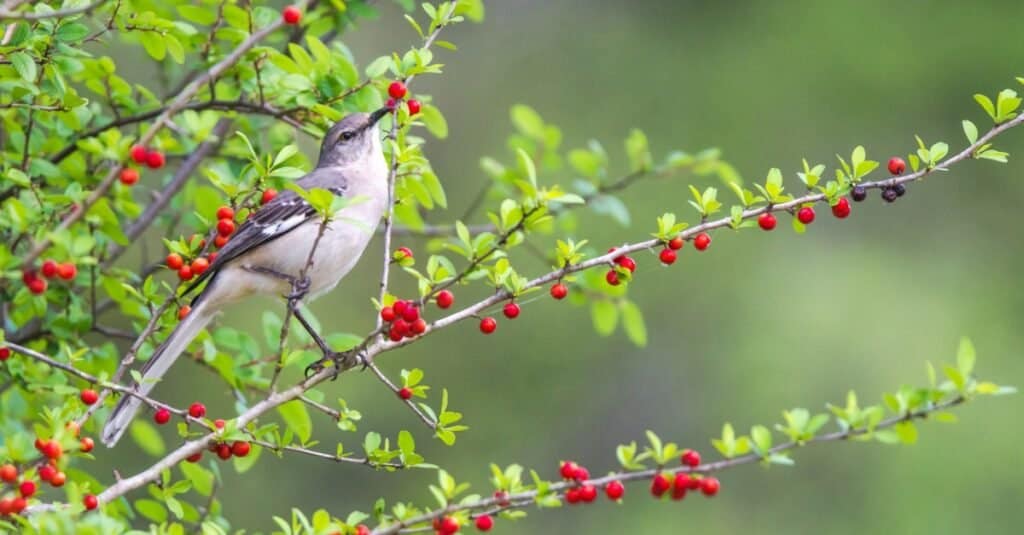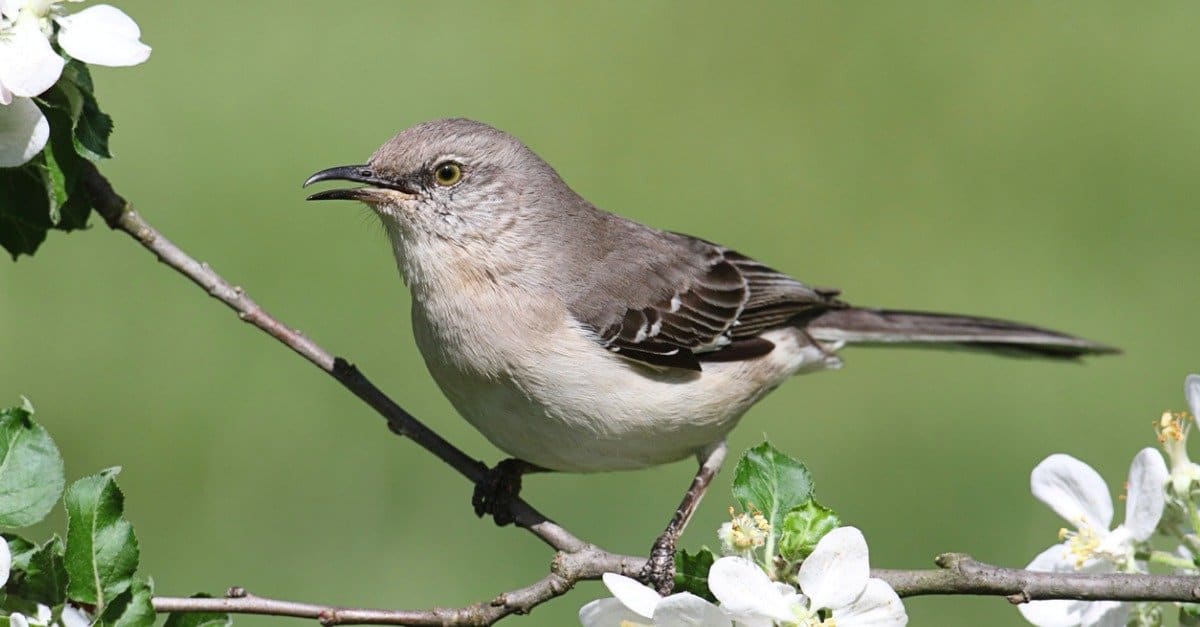Mockingbirds are medium-sized birds native to North America. If you happen to live in North America, it’s more than likely that you’ve seen one of these birds in your backyard before as they are quite common. The mockingbird’s Latin name is Mimus polyglottos, which translates to “many-tongued mimic.”
This is because the mockingbird gets its name from its ability to mimic other species’ noises and cries as well as non-animal sounds such as sirens, fire alarms, and even the sound of a washing machine. In fact, mockingbirds are capable of mimicking up to 50 different vocal sounds! This remarkable little bird has even been named the official state bird of Arkansas, Florida, Mississippi, Tennessee, and Texas.
As they have adapted to human development, mockingbirds can be found all throughout suburban areas and cities in North America. So, what type of diet does this bird eat to keep up its appearances in so many backyard trees? We’ll explore the eating habits of the mockingbird and what makes up the bulk of their diets.
What Do Mockingbirds Eat?

Mockingbirds eat a diet that consists of insects, fruits, and seeds. They are predominately classified as omnivores as they eat both plants and animals. These birds forage throughout the day and sometimes even into the night.
Check out a complete list of foods mockingbirds eat:
- Insects (beetles, grasshoppers, caterpillars, ants, and wasps)
- Berries (elderberry, blackberry, juniper, and pokeweed)
- Fruits (apple slices, raisins, oranges, grapes, and bananas)
- Seeds
Adult mockingbirds’ diets are roughly 50% arthropods and 50% native and cultivated fruits.
However, mockingbirds don’t always adhere so strictly to this diet. According to a study published in The Birds of North America, Inc, while mockingbirds do eat a wide variety of arthropods and fruits, they also occasionally eat small lizards.
How Do Mockingbirds Hunt?

Mockingbirds hunt insects by lunging at them.
©iStock.com/Kanokwalee Pusitanun
Since they are omnivores, mockingbirds do have to hunt for arthropods and insects to eat. This is typically done by walking, running, or hopping around on the ground. Once they see potential prey, they will then run a short distance and then lunge at their prey on the ground.
They are also able to catch insects that are just above the ground. If a mockingbird is perched up in a tree and spots an insect, it will then fly down directly, killing and dismembering the prey there or bringing it back to the perch.
When they aren’t hunting for insects, mockingbirds will simply pick fruits while perched in a tree or a shrub.
What Do Baby Mockingbirds Eat?
Baby mockingbirds are called chicks. Unlike adult mockingbirds, baby mockingbirds are a pickier eater. Baby mockingbirds must eat soft arthropods and invertebrates like caterpillars, worms, and different larvae. In North America, beetle larvae account for the majority of a baby mockingbird’s diet.
After only a few days, as the chicks begin to get older, meals begin to shift more towards fruits and seeds. In most mockingbird species, both parents help with feeding. Interestingly enough, unlike many other bird species who unfairly divide food portions, mockingbirds make the effort to feed their nestling in equal quantities – no matter how many chicks there are.
What Do Mockingbirds Eat in the Winter?
North America has a continental climate, meaning that the winters are cold and the summers are hot. Winters become especially cold the further up north you travel. During the winter season, mockingbirds rely heavily on berries and wild fruit. Their diet throughout the colder months mostly consists of fruit, especially mockingbirds who are further up north.
What Do Mockingbirds Eat in the Summer?
Once the warmer months come around, the mockingbird will begin to shift its diet. In the late spring and summer months, they primarily rely on insects like beetles, earthworms, moths, butterflies, ants, bees, wasps, grasshoppers, and even small lizards.
What Are the Mockingbird’s Predators?
Mockingbirds are not particularly large birds. The average adult male mockingbird grows to be about 22 to 25.5 cm in length and averaging 51 grams in weight while females range from 20.8 to 23.5 cm long and weigh an average of 47 g. As songbirds who primarily feed on small insects and fruit, they are also not well equipped to fight off any large predators.
Because of this, sharp-shinned hawks, scrub jays, great horned owls, and screech owls all prey on adult northern mockingbirds. While these larger birds prey on fully grown mockingbirds, there are other medium-sized birds and predators that prey on their chicks and eggs. These include Blue jays, fish crows, American crows, snakes, and squirrels.
However, since mockingbirds are equipped with the ability to mimic sounds and create noise, adults will sound out alarm calls when a predator is approaching their nest. Adults mockingbirds are also able to form mobs to strike any predators that may try to cross them.
How Does The Mockingbird Diet Impact Other Species
The urbanization of society can lead many of us to forget the impact that so many species have on the planet. The mockingbird is no exception to this as they play an incredibly important role. Northern mockingbirds play an important role in seed being dispersed.
After indulging in a delicious fruit meal, Northern mockingbirds will expel seeds in their feces after eating berries or fruits. This aids in the dispersion of the plant’s seeds.
Along with aiding in the dispersion of seeds, mockingbirds also influence the insect populations that they eat. Northern mockingbirds are home to a variety of ectoparasites some of which include Blowfly larvae (family Calliphoridae), fleas, and mites.
Thank you for reading! Have some feedback for us? Contact the AZ Animals editorial team.








